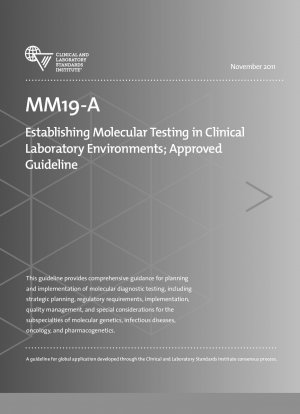CLSI MM19-A-2011
Establishing Molecular Testing in Clinical Laboratory Environments; Approved Guideline
- Standard No.
- CLSI MM19-A-2011
- Release Date
- 2011
- Published By
- US-CLSI
- Latest
- CLSI MM19-A-2011
- Scope
- This document was written by experienced molecular laboratory professionals to provide an introduction to molecular diagnostics for nonmolecular, routine clinical laboratories, as well as a framework for decision making and implementation of molecular testing. The target audience of this guideline is the stakeholders who play a role in the strategic decision to implement a molecular diagnostic program, including the: ? Medical and technical directors who may not have previous experience with molecular testing ? Supervisory technical staff who implement molecular assays for the first time ? Quality management systems (QMS) group who will adapt the quality plan to incorporate the unique aspects of the new program ? Production staff that will perform and maintain all aspects of the assays Because molecular diagnostics encompasses a very broad area, this document focuses on clinical applications and technologies most likely to be used in a laboratory that is venturing into molecular testing for the first time. The laboratory may have a concentration in a specific subspecialty (eg, microbiology) or not. However, given that this document is written for nonmolecular experts, several more complex areas of molecular testing were excluded from the scope, including: ? Complex technologies, including, but not limited to, laboratory-developed tests (LDTs) that require primer and/or probe design, proteomics, pulsed-field gel electrophoresis, multiple locus sequence testing, and repetitive extragenic palindromic sequence-based polymerase chain reaction (PCR) ? Complex reflex testing algorithms ? Laboratory tests that require a high degree of clinical expertise to interpret, such as donor-recipient compatibility typing, and molecular typing of strains possibly related in an outbreak ? Tests for sexual abuse and forensics ? Tests of the blood and tissue supply (eg, blood banks) It is also out of the scope of this guideline to consider assays that should remain in specialized or esoteric testing facilities, such as: ? Methods for detecting pathogens such as bioterrorism agents that require biosafety levels (BSL) 3 or greater, which are otherwise handled in specialized facilities ? Prenatal diagnosis and preimplantation genetic diagnosis (PGD) of heritable disease
CLSI MM19-A-2011 history
- 2011 CLSI MM19-A-2011 Establishing Molecular Testing in Clinical Laboratory Environments; Approved Guideline
